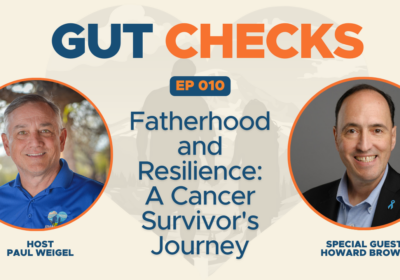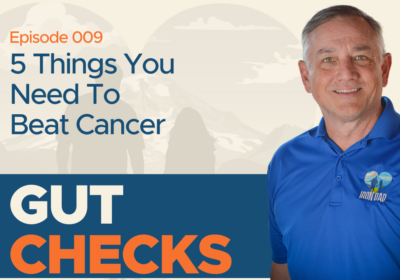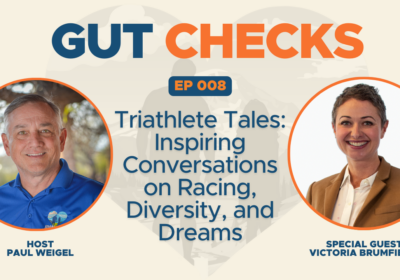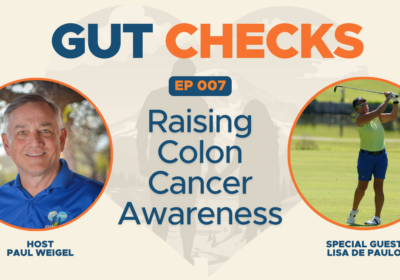From Diagnosis to Ironman: The Power of Perseverance in the Face of Cancer
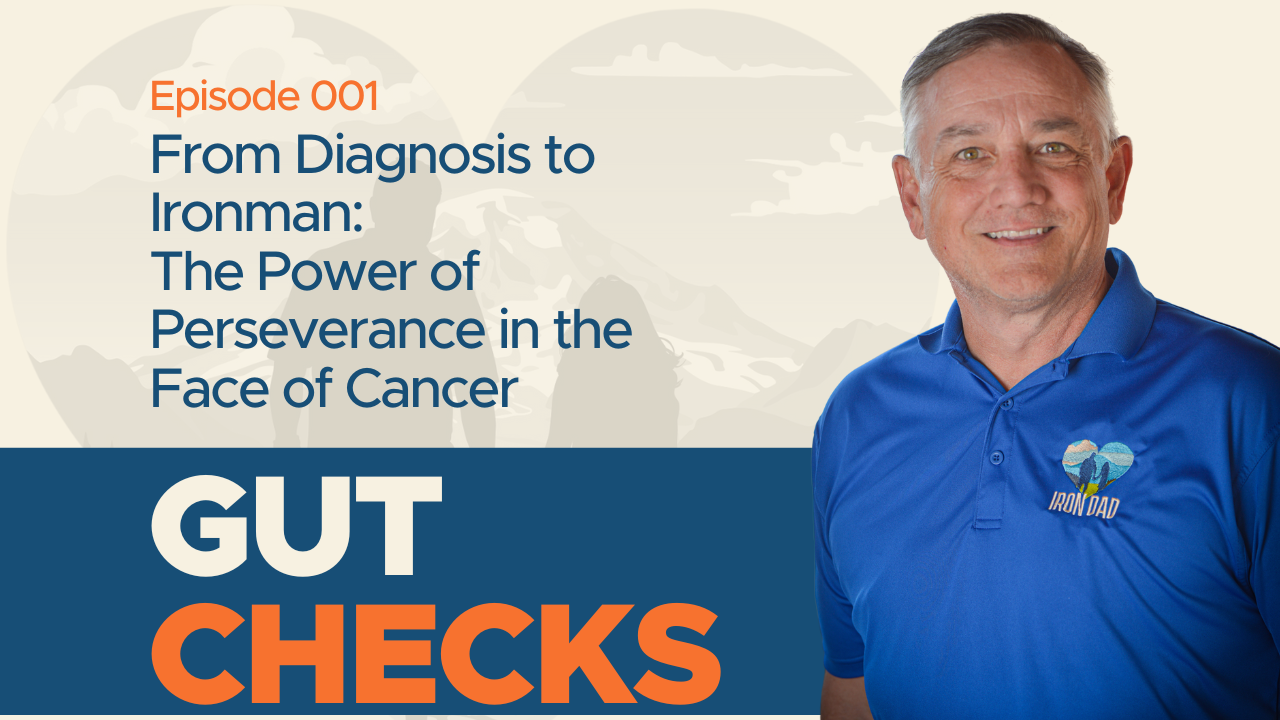
In this moving premiere episode, Paul shares his harrowing yet uplifting journey from being diagnosed with stage 3 colon cancer at 43 to becoming an 11-year survivor and a six-time Ironman triathlete. He delves into the initial struggle with symptoms, misdiagnosis, and the profound impact of his condition on his personal life. With insights from the cancer community and triathlon experts, Paul’s story is not only about the physical feats of participating in Ironman events post-chemotherapy but also about the emotional and mental resilience that fueled his recovery and advocacy. His narrative is a beacon of hope and inspiration, encouraging others to persevere through their battles with cancer and highlighting the importance of early detection, proper medical guidance, and the strength found in fighting back against life’s toughest challenges.
To learn more about Paul and the Iron Dad Book, head on over to https://irondadbook.com.
Thanks for listening!
Thanks so much for listening to our podcast! If you enjoyed this episode and think that others could benefit from listening, please share it using the social media buttons on this page.
Do you have some feedback or questions about this episode? Leave a comment in the section below!
Subscribe to the podcast
If you would like to get automatic updates of new podcast episodes, you can subscribe to the podcast on Apple Podcasts or Stitcher. You can also subscribe in your favorite podcast app.
Leave us an Apple Podcasts review
Ratings and reviews from our listeners are extremely valuable to us and greatly appreciated. They help our podcast rank higher on Apple Podcasts, which exposes our show to more awesome listeners like you. If you have a minute, please leave an honest review on Apple Podcasts.
Transcript
Hi, everyone. Welcome to the Gut Checks podcast. I'm Paul Weigel. I'm an 11 year colon cancer survivor, a six time Ironman triathlete, and the dad to just an awesome 14 year old daughter. Now I'm really glad you're here, we're gonna share stories of the power of perseverance, hope and inspiration. And each episode will have a lot of information a lot of different ways. Now, gut checks can be a lot of different things to a lot of different people can be having difficult conversations with your doctor about things as silly as that gut checks can also be when you have to dig deep within yourself and imagine the impossible and have the incredible country. We're going to interview some really amazing people during these podcasts. First and foremost, we're going to talk with people within the cancer community. So make sure that those cancer patients have got the resources information they need. We'll be talking with groups like LIVESTRONG, colorectal cancer, Caroline's and Man up to cancer so you know, and have information in front of you, and have contact with what you need, when you need it. We're also going to have some interviews with colorectal cancer patients, so you can hear about their experiences and how they survived and thrived throughout treatment and afterward. This is much more than just the cancer podcasts.
Paul Weigel:Now, I mentioned that I'm an Ironman triathlete. Well, I did an Ironman triathlete six months after finishing chemotherapy, and being an athlete and finding that will and determination is super important to me. So we've got some interview setup within the triathlon community too. And we're going to interview some people with USA Triathlon, as well as the voice of Ironman himself, Mike Riley. Well, to be honest, I didn't expect to be doing these podcasts anyway. The song caught on like wildfire, read less humans. But we'll get back to that in a few minutes. Let's get back to the basics. About 11 years ago, when I was 43, I was diagnosed with stage three to C colon rectal cancer. The tumor I had was about the size of your fist, and the junction of my rectum and Nightfallen. And that left me about 100% blocked, which means that it was almost impossible to go to the bathroom. When in fact, we almost had to have a slight diverted from Chicago to Seattle because I was so sick. I had symptoms for years, at least for five years started were all of a sudden foods that I used to be able to eat, I couldn't anymore. I used to love pizza. But all of a sudden pizza didn't love me. I just chalked that up to being lactose intolerant. But then I started noticing blood in the toilet. And as the tumor started getting larger and larger, I always felt constipated. And then I had a dramatic weight loss before I finally saw a GI specialist really to dig deep and find out what was going on.
Paul Weigel:Now the ironic part about all this is I had a bunch of conversations with my general physician, about my health and about my symptoms. I told him about the blood in my stool. And he just brushed it off assuming that I had hemorrhoids because after all, I was in my late 30s and early 40s. And how in the world could you have fallen cancer anything super extreme at my age. And at the same time, you know, I felt that I was young too and cancer wasn't anything I could possibly consider. And I was spending all my time focused on my three year old, almost three year old daughter Natalie. Well, I mentioned that my symptoms were getting worse and worse. And I mentioned that flight they got terrible. So I finally had a colonoscopy. And when I finally had my colonoscopy The doctor didn't say you had cancer. He said I had a tumor. He said I got a growth and but I need to start treatment as soon as possible. And all I could think of was all those different things I was never going to see. My daughter experienced that she grew up and that was amazingly horrible and amazingly scary. So while I was going through treatment, I pretended I wasn't a cancer patient. Honestly it was because I thought it was going to die. I slipped off six weeks after having my tumor removed and I did a little sprint triathlon. I did a couple half marathons while I was going through treatment. And I even did a half marathon with my chemotherapy backpack, about tightly around my back. And then six months later, ended up doing an Ironman triathlon. Now, once I was done with all that, I just needed to move forward and put the chapter behind me because it was too hard, it was too awful. I need to put it on a shelf and have it all go away.
Paul Weigel:Cancer had not only taken dreams and hopes of a future away from me that it also killed my marriage. We separated and got divorced almost a year later. And I was just desperate to move on. Now, I said that I thought it was going to die. And part of it was because things were so awful. But then also, at the end of treatment, they were still monitoring me. And they were still checking on things. And even though they said I was fine. They kept seeing different things, they wanted to double check. And they kept seeing things that they needed to have continued evaluations on their thoughts in the wrong place more, or shadows where they weren't supposed to be. And it took them nine years before they finally said that I was cancer free. Nine years is a long time to be so finally two years ago, and it's gonna make you it's a great card. And at the time, my daughter was getting old enough. She was tall group at that time. And she started asking questions about what happened during that time. One of the things I didn't mention was during treatment, I wrote a blog about my experience, so everybody else knew what they might expect in the future. Or said that people didn't have my experience and so that they made a point of getting screened. So when Natalie started asking me questions like Dr. Natalie, I took those notes, and I started putting together this book.
Paul Weigel:So Iron Dad was first called Cancer Blink, and I called it Cancer Blink because I saw the sign that said I stared cancer in the awning of cancer blinks. And that was going to I tried to have that been my metaphor, even though I didn't leave it because I thought I was going to die. This I started writing the story became more and more not about my fight about cancer, but about my life and about my hopes and dreams and inspiration. And how in the world did I do an Ironman Triathlon six months after finishing chemotherapy and what was that drive for now I could possibly get it done. When it really came down to was my daughter St. My wife had had a hard life before she was born. And really didn't feel I had a lot to live for. It was so ironic. was so ironic that justice, like seemed to be getting sorted out. That year, I get diagnosed with cancer. And finally, when I've got something to live for, like life is just gonna be torn away. And here I had somebody I could hope and dream and, and imagine a wonderful future as part of my world and it was just going to be formed and taken in a way that was so horrible and so awful. You know, when the doctor when he told me that I have this tumor. All I could think about was not seeing to grow up. For first bike ride her first boyfriend from her own marriage. I knew I had to fight. That was my story. I really started to write on your dad last summer. I took my blog and started working with a book editor and she said just start writing your story. And so I started playing it together. And that started saying this is who I was. And this is where I was going to start working with a really great friend of mine, Mary do chnc and Mary was fighting her own battle with cancer, one that she lost just a couple months ago. And we worked diligently on the book week after week, I made a point to dive in and write chapters and and content for her that was pathetic for me but also at the same time, a distraction for her from her own battle and her own mortality that she was unbelievably facing. And my goal, my goal was to finish iron dead before she passed and I didn't Okay,
Paul Weigel:see, gotta see close to a rough cut vinyl copy. But unfortunately, you know, cancer got her, I really was lucky to have one final conversation with her where we both could share her hopes and dreams and about what the book could be in where it could go and, and the power of hope and the power of perseverance. And I was also lucky enough to, to tell her how important she was to me and, and feel comfortable enough to say, how much I loved her as a friend and, and just how great of a person she was. And that was something that we, we lose the perspective on getting a chance to say so much of the time. So, all this time she and I spent working back and forth together on this or in product was my memoir iron dad. That's the cancer survivor story of discovering strength, life and love through fatherhood. You know that, I'll be damned. It's a pretty good book. My story was really designed to explain to Natalie what happened, then you have something that I can be proud of, that maybe a handful of people could look at, but not something that was bigger over the top. And that's when things exploded. Because just as I finish the book, American Cancer Society came out with this report that said that Colorectal cancer is growing at this exponential rate. That now is the number one leading cause of deaths of cancer for men. And the number two leading cause of cancer deaths for women in the United States. And every year, that percentage goes up by at least 1%. That's just unacceptable.
Paul Weigel:So Carrie, I finished my memoir. And this report came out. I sent out some exploratory messages to different people in groups to see their interest. And I was blown away by their response. I mean, really, this was so little memoir, it was it was a book that I had written with a friend, explain to my daughter what my treatment was like, and maybe could provide some hope and inspiration for others. But as I started reaching out, people started lining up in support of it, whether it be Cancer Society's physicians, athletes and media. Less than two months after I started talking about it, in part of a PSA with Katie Couric mean, how crazy is that? Fairy sign. But just as much, just as much work horrified me was that here, this is 10 years later, this is 10 years, 11 years after I went through my own treatment. That even though we have new technology out there, like colocar, that even though we've gotten better and more effective treatment, left and right, that the cancer rates continue to go up. That doctors are not listening. They're not exploring, they're not having those hard conversations with their patients. That's horrible. And just as much that's still happening, even though the recommended age to get screens now down to 45. I think part of the reason I get teary is not only facing my own mortality because as I have told my story, I see how people look at me how cancer patients look at me, they look at me like I'm a ghost. That how can I be as sick as I was 10 or 11 years ago and still be around, let alone doing what I'm doing. And what I also learned while talking to these cancer patients is that they're scared that they're not fighting the disease in the same way I did that they're being hassled and letting cancer win and that's not okay. That's not okay. We need to change that we need to find ways that we are thinking about our own experience of battling and fighting cancer aggressively and not being a victim. And I hope to continue being a fighter and somebody who can be inspirational in lots of different ways. I'm hoping to do that again with another Iron Man, which would be myself. I'm finishing Ironman, California this October. So here I am now. I am an 11 year colon cancer survivor and was sixth time, Ironman triathlete. And I have a 14 year old daughter and I have a heterodox future I had him. And obviously it's been hard. I really do hope that is you listen and watch these podcasts that you'll get moments of hope and inspiration. And for those of you who don't fully understand, they'll see how hard this is. Thank you for listening and watching this podcast today and for taking care of your health





